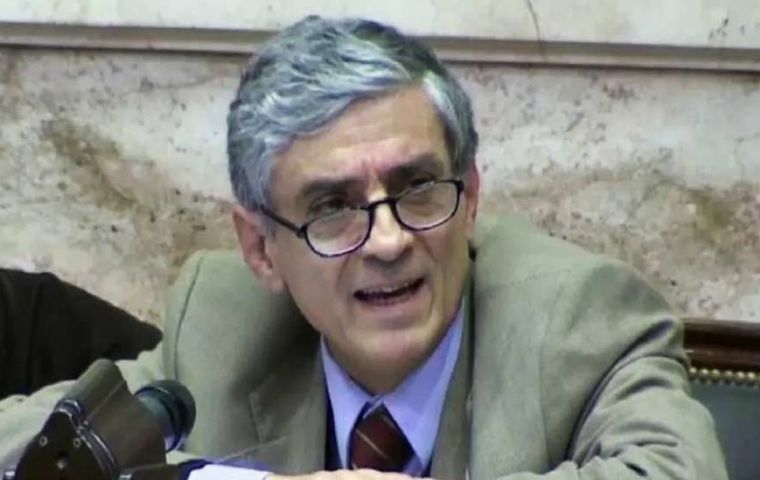MercoPress. South Atlantic News Agency
Congressman from Argentina's ruling FdT want bank deposits nationalized, Perón style
 Martiarena has gone rogue from his FdT colleagues
Martiarena has gone rogue from his FdT colleagues National Deputy José Luis Martiarena from the province of Jujuy's Frente de Todos party of President Alberto Fernández Thursday submitted a bill whereby bank deposits would be nationalized “to reform the financial system.”
Lower House Speaker Sergio Massa and FdT bloc leader Máximo Kirchner quickly pointed out the initiative stemmed purely from Martiarena and did not involve the ruling party.
Martiarena reached the Lower House from Jujuy in 2017 on behalf of the Justicialist (Peronist) Front. In April this year he joined Proyecto Sur, the party founded by the late Fernando “Pino” Solanas, which is part of the Frente de Todos.
“The project of the national deputy from Jujuy which proposes the nationalization of bank deposits does not have the endorsement of the presidencies of the House and the bloc. It is the initiative of one deputy out of 120 and is not accompanied by those who are a part of the ruling party,“ said the FdT in a statement.
The bill, titled ”Reform of the financial system for economic renewal and national reconstruction“ says that ”The State must control the economy and not be held hostage by Financial Sectors. I propose the Nationalization of Bank Deposits to protect savings and recover regionalized credit for Economic Reactivation.”
Martiarena's bill mentions “commercial, investment, development, mortgage banks, financial companies, consumer credit companies, credit and savings banks (…) will proceed to transfer all deposits to the Central Bank of the Republic Argentina (BCRA) and the pertinent accounting records will be carried out for that purpose” and “the reception of deposits in pesos can only be made nationwide the country by the BCRA.”
The bill also intends that “banks and other financial entities may not make or use deposits and funds without the authorization of the BCRA, although allowing for withdrawals and movements holders have on them.”
Martiarena maintains that the nationalization of bank deposits implemented by former president Juan Domingo Perón in 1946 “allowed the economy to be conducted and put it at the service of the country's national development,” and that “before Perón, the Argentine economy was managed by foreign banks.”
”With the nationalization of the deposits, they were guaranteed by the BCRA, and the national State had the participation of all economic sectors,“ says the Jujuy lawmaker. With this reform ”financial structures” would “change in a profound and revolutionary way, the credit policy is oriented and put at the service of productive and industrial activities with promotion programs that made Argentina's economic and social take-off possible.”
Martiarena spoke of a structural economic reform which would reverse the one implemented “since 1977 to date.” He insisted on “changing the neoliberal financial policy of speculation and financial fraud of the military dictatorship and of (the former Minister of Economy) José Martínez de Hoz, [which] has destroyed productive economy...”.
Little over a month ago, Martiarena gained notoriety when he called for a compulsory house-to-house vaccination campaign to deal with SARS-CoV-2 and its new Delta strain
He had also requested to add COVID-19 vaccines to the National Program for the Control of Immunopreventable Diseases, free of charge and mandatory.
“The national Executive Power, through the Ministry of Health of the Nation and every agency that may be necessary, will immediately promote an intense house-to-house vaccination campaign throughout the national territory in coordination with CABA, the provinces and municipalities...,” Martiarena had envisioned.
Martiarena had based his bill an an alleged report from the United States Center for Disease Control and Prevention, according to which those vaccinated were not at risk of death from the infection.




Top Comments
Disclaimer & comment rulesCommenting for this story is now closed.
If you have a Facebook account, become a fan and comment on our Facebook Page!